|
|
|
Sort Order |
|
|
|
Items / Page
|
|
|
|
|
|
|
| Srl | Item |
| 1 |
ID:
152893
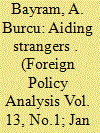

|
|
|
|
|
| Summary/Abstract |
Why do publics in donor countries support development foreign aid? Focusing on material factors, ideology, and identities, the literature has largely neglected the moral basis of foreign aid attitudes. I argue that generalized trust, defined as the belief in the integrity and trustworthiness of people, is a crucial component of the moral calculus of publics in donor countries. Using data from independently conducted surveys of global (World Values Survey) and American mass publics (Core Values Project Survey), I show that generalized trusters are more likely to aid the have-nots of the world than those who lack trust in people. This finding indicates that the bonds of trust expand the boundaries of global justice. By illuminating the role generalized trust plays in shaping donor public attitudes towards development foreign aid, this study helps improve the political economy, ideology, and identity models of aid, contributing to the literatures on foreign aid and foreign policy attitudes, and to theories of cosmopolitan global justice.
|
|
|
|
|
|
|
|
|
|
|
|
|
|
|
|
| 2 |
ID:
174440
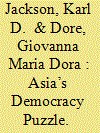

|
|
|
| 3 |
ID:
141218
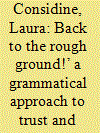

|
|
|
|
|
| Summary/Abstract |
This paper asks what it is that we are doing when we talk about trust in international politics. It begins by reviewing the recent and growing body of research on trust and International Relations (IR). It claims that the existing literature is based on particular practices of representation that unquestioningly attempt to find the correct meaning for trust and that this representational account of meaning limits the form of the research, carrying assumptions about meaning that lead to several semantic and methodological problems. The paper challenges this way of understanding through the use of Ludwig Wittgenstein’s Philosophical Investigations and proposes an alternative, grammatical approach to trust and IR based on ‘meaning as use’. To illustrate this, the paper then conducts a grammatical investigation of the use of trust regarding nuclear arms control with the Soviet Union during the second term of the Reagan presidency. This challenges the familiar narrative of the role of trust at this time by going back to the ‘rough ground’ of President Reagan’s speech on trust and nuclear weapons.
|
|
|
|
|
|
|
|
|
|
|
|
|
|
|
|
| 4 |
ID:
092039
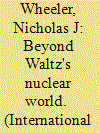

|
|
|
|
|
| Publication |
2009.
|
| Summary/Abstract |
In 1981 Kenneth Waltz published a controversial Adelphi Paper, 'The Spread of Nuclear Weapons: More May Be Better', in which he turned the conventional wisdom on its head by arguing that the spread of nuclear weapons would not be a terrifying prospect. This article rejects the proposition that fear of nuclear destruction can serve as a permanent basis of international order, and argues that securing order depends upon the building of trust between nuclear-armed and arming powers. A key contribution here has been the theory and practice of security communities, which opens up the promise of replacing nuclear threats by a new international politics in which force has been delegitimated as an instrument of state policy. This article discusses the potential for nuclear trust-building through the example of the security community that developed between Argentina and Brazil in the 1980s. Both countries had the potential to develop nuclear weapons by the end of the 1970s, and there were concerns that their rivalry might lead to a regional nuclear arms race. Having explored the factors that promoted trust between Buenos Aires and Brasilia, the article considers the lessons that can be learned for nuclear trust-building elsewhere.
|
|
|
|
|
|
|
|
|
|
|
|
|
|
|
|
| 5 |
ID:
165203
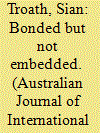

|
|
|
|
|
| Summary/Abstract |
The aim of this article is to use theories of bonded and embedded trust to explain the ‘roller-coaster’ nature of the Australia-Indonesia relationship. An examination of Prime Minister Keating and President Suharto as a case of bonded trust between leaders reveals the value such a relationship has in building trust in bilateral relations. However, it also reveals that such trust cannot survive changes in leadership if it has not become more broadly embedded in both government and society. This is particularly problematic given Australia’s tendency for rapid leadership and ministerial turnover across the past decade. While President Joko Widodo and Prime Minister Turnbull were able to develop a warm relationship which helped to reset the relationship and enabled them to navigate diplomatic incidents, Malcolm Turnbull’s recent political demise only serves to further highlight the necessity of building trust between societies. Without trust, cooperation between the two states will be limited. Building trust between societies will be required if Australia wants to develop a trusting relationship with Indonesia capable of undertaking deeper forms of cooperation on more sensitive issues – something which will be fundamental to Australia’s ability to navigate growing strategic uncertainty in the region.
|
|
|
|
|
|
|
|
|
|
|
|
|
|
|
|
| 6 |
ID:
068050
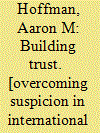

|
|
|
|
|
| Publication |
New York, State University of New York press, 2006.
|
| Description |
xiii, 213p.
|
| Series |
SUNY series in global politics
|
| Standard Number |
0791466353
|
|
|
|
|
|
|
|
|
|
|
|
Copies: C:1/I:0,R:0,Q:0
Circulation
| Accession# | Call# | Current Location | Status | Policy | Location |
| 050935 | 327.17/HOF 050935 | Main | On Shelf | General | |
|
|
|
|
| 7 |
ID:
089414


|
|
|
|
|
| Publication |
2009.
|
| Summary/Abstract |
Bangladesh's parliamentary elections in December 2008 witnessed a landslide victory for an alliance led by Sheikh Hasina's Awami League following two years of a caretaker government backed by the military. The country's beleaguered population faced the twin challenges of natural disasters and pervasive poverty. One of the key factors influencing trust in the government of Bangladesh is stability, which has been in short supply because of confrontational politics between the two largest parties and accompanying violence. This paper considers efforts to rebuild trust by examining the work of a social movement, Transparency International Bangladesh (TIB), at two levels: strengthening the pillars of the national integrity system (with a specific focus on parliament), and holding public bodies to account for corrupt practice in delivering key services. People's experiences of services delivered through schools, hospitals and local government have resulted in a complete collapse in trust in public bodies. The commitment of the democratically elected government to tackle corruption at all levels will be a key determinant of whether trust and stability can emerge from the volatility of Bangladesh's politics.
|
|
|
|
|
|
|
|
|
|
|
|
|
|
|
|
| 8 |
ID:
147696
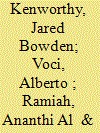

|
|
|
|
|
| Summary/Abstract |
Across one longitudinal and two cross-sectional surveys in Northern Ireland, we tested a model of intergroup relations in which out-group attitudes and behavioral tendencies are predicted by cross-group friendship and positive intergroup appraisals, mediated by intergroup emotions and out-group trust. In study 1, out-group friendship at time 1 predicted out-group trust at time 2 (one year later), controlling for prior out-group trust. In study 2, positive and negative intergroup emotions mediated the effects of friendship on positive and negative behavioral tendencies and attitudes. In study 3, a confirmatory factor analysis indicated that trust and emotions are distinct constructs with unique predictive contributions. We then tested a model in which cross-group friendship predicted intergroup emotions and trust through intimate self-disclosure in out-group friendships. Our findings support an integration of an intergroup emotions framework with research highlighting the importance of cross-group friendship in fostering positive intergroup outcomes.
|
|
|
|
|
|
|
|
|
|
|
|
|
|
|
|
| 9 |
ID:
189965
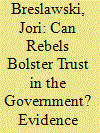

|
|
|
|
|
| Summary/Abstract |
Commitment problems make civil wars difficult to end. Research on overcoming commitment problems focuses on warring parties, however civilians’ perceptions are central to successful transitions from war to peace. While civilians residing in areas previously controlled by armed groups may be highly distrustful that governments will implement peace agreements, I argue that some armed groups are both motivated and capable of improving trust in the state. Using survey data from civilians in the Bangsamoro, Philippines, I show that civilians that experienced rebel security provision or rebel justice provision from the MILF are more likely to trust that the Government of the Philippines will fully implement the peace agreement than civilians that did not experience rebel governance provision.
|
|
|
|
|
|
|
|
|
|
|
|
|
|
|
|
| 10 |
ID:
112631
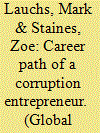

|
|
|
|
|
| Publication |
2012.
|
| Summary/Abstract |
The study of criminal career paths is necessary to understand the methods of success employed by high-performing criminals. The aim of this article is to focus on the career path of Jack Herbert who set up and maintained extensive corruption networks between organised crime groups and police in the Australian state of Queensland. This study builds on Morselli's work on the career paths of Sammy Gravano and Howard Marks that demonstrate how understanding social networks is an essential part of comprehending how organised criminals succeed. The data for this study were taken from the transcripts of the Fitzgerald Commission of Inquiry, which uncovered the extensive and resilient corruption network operated by Herbert. Herbert's relationships have been plotted to establish the nature of his operations. The findings indicate that communication of trust both allows for success and sets the boundaries of a network. Most importantly, this case study identifies Herbert's reliance on holding a monopoly as the cornerstone of his network power and position. This article adds to the literature on criminal career paths by moving away from a classic organised criminal grouping into the area of police corruption and uncovers the distinctive opportunities that this position offers the career criminal.
|
|
|
|
|
|
|
|
|
|
|
|
|
|
|
|
| 11 |
ID:
144745
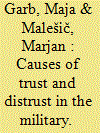

|
|
|
|
|
| Summary/Abstract |
Trust in institutions is an important issue of political science and sociology. This article contributes to the discussion by exploring public trust in the military at the global, regional and national levels, and the causes of trust and distrust in the military. Analyses of public opinion data reveal that the military is a highly trusted social institution across the world. In Slovenia, the trust in the military is high as well; however, it is lower than international data would suggest, averaging at 50%. Against this background, the article focuses on the causes of trust. The original empirical survey was accomplished and shows that the most significant causes of a high level of trust in the military are its frequent and successful involvement in disaster relief, its professional qualifications and high performance, as well as its national defense role. Whereas the key causes of distrust are: the poor levels of transparency in its procurement process; the politicization of the military and organizational problems.
|
|
|
|
|
|
|
|
|
|
|
|
|
|
|
|
| 12 |
ID:
165936
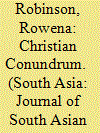

|
|
|
|
|
| Summary/Abstract |
The question of what constitutes the content of civility even as we seek to empty it of rigidly conceptualised Western understandings remains important. An interesting possibility is to reanimate the idea of civility with the notion of trust, but that again begs the question: ‘what is trust?’ My thinking on this subject is framed by constitutional values, and from that perspective, I perceive the ‘civility–trust’ dyad as being the social evocation or impression of the constitutional value of fraternity about which Ambedkar spoke in the Constituent Assembly. He suggested something of a content to fraternity which can then be employed to think through our understanding of civility. Against this backdrop, I listen to the voices of Tamil-speaking Dalit Christians and activists and the ways in which they try to come to terms with and struggle against the forms of incivility and ‘second-class’ citizenship they are up against, and how they make any sense of this with regard to constitutional values and Christian ones, both of which they should be able to lay claim to, but in which they are denied full participation.
|
|
|
|
|
|
|
|
|
|
|
|
|
|
|
|
| 13 |
ID:
159247
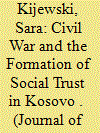

|
|
|
|
|
| Summary/Abstract |
While a new, growing subset of the literature argues that armed conflict does not necessarily erode social cohesion in the postwar era, we challenge this perspective and examine how civil war experiences shape social trust in Kosovo after the war from 1998 to 1999. Based on a nationwide survey conducted in 2010 and the disaggregated conflict event data set of the Armed Conflict Location & Event Data Project, we simultaneously analyze the impact of individual war-related experiences and exposure to war in the community through hierarchical analyses of twenty-six municipalities. Our findings confirm that civil war is negatively related to social trust. This effect proves to be more conclusive for individual war experiences than for contextual war exposure. Arguably, the occurrence of instances of violence with lasting psychological as well as social structural consequences provides people with clear evidence of the untrustworthiness, uncooperativeness, and hostility of others, diminishing social trust in the aftermath of war.
|
|
|
|
|
|
|
|
|
|
|
|
|
|
|
|
| 14 |
ID:
140858
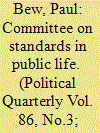

|
|
|
|
|
| Summary/Abstract |
In his recent memoir, William Waldegrave wrote that no country run by John Major and Robin Butler was likely to be in much danger of systemic corruption. The fact remains that a quarter of a century ago, John Major, with the guidance and support of his cabinet secretary, decided to establish the Committee on Standards in Public Life under the chairmanship of Lord Nolan. The apparent prevalence of ‘sleaze’ issues in public life—most notably the ‘cash for questions’ scandals involving Tory MPs—provoked the decision. Lord Nolan's committee immediately enunciated seven principles of public life: honesty, accountability, integrity, selflessness, openness, opportunity and leadership. Over the years, many of the Committee's recommendations have been accepted. There is today vastly greater transparency. The principles have been widely accepted; it is clear the public expects that they should be observed by public servants, including, perhaps especially, MPs. Yet it is equally clear that there is a widespread and still deepening mood of public cynicism on standards matters. The Committee is determined to defend the Nolan principles, but without more help from the political class it will be like Mrs Nupkins in The Pickwick Papers: inculcating moral lessons of great importance and generally ignored.
|
|
|
|
|
|
|
|
|
|
|
|
|
|
|
|
| 15 |
ID:
093952
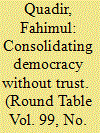

|
|
|
|
|
| Publication |
2010.
|
| Summary/Abstract |
This paper makes a departure from the dominant formalistic approach to 'democratic consolidation' to explore a range of issues, especially mutual distrust and misperception, to analyse why Bangladesh's quest for democracy remains elusive. By taking a closer look at the events that led to the collapse of democracy in 2007, it provides new insights into the failure of relevant political actors to reconcile their personal and political differences in order to give democracy a chance to take root in the country's seemingly dysfunctional political landscape. It suggests that the emergence of what can be called the politics of distrust was a major factor in the breakdown of democracy in 2007. Moving the debate beyond the practice of holding free and fair elections on a regular basis, it is argued that Bangladesh's prospect for fostering a democratic political culture depends on the ability of rival political actors to make concerted efforts to build credible, well-functioning legal and political institutions that cultivate a culture of trust not only among political parties but also between the democratic state and the ordinary citizens.
|
|
|
|
|
|
|
|
|
|
|
|
|
|
|
|
| 16 |
ID:
096083
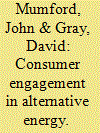

|
|
|
|
|
| Publication |
2010.
|
| Summary/Abstract |
The introduction of alternative energy requires collaboration between consumers, energy suppliers and regulators. A fundamental question is, will consumers engage with this agenda and, in particular, will they trust the institutions sufficiently to enable the collaborations that are needed. Present indications suggest that consumers have little trust in the established institutions and tend to reject such collaborations.
This article presents two case studies which explore the way consumers, regulators and energy suppliers interact in relation to alternative energy projects. It analyses the inter-group interactions from the perspective of symbolic interactionism and discusses the aspects that undermine trust, leading to suggestions for improved trust.
|
|
|
|
|
|
|
|
|
|
|
|
|
|
|
|
| 17 |
ID:
120507
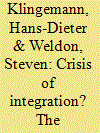

|
|
|
|
|
| Publication |
2013.
|
| Summary/Abstract |
The healthy functioning and long-term viability of the European Union (EU) ultimately depend on its citizens finding common cause and developing a shared sense of political community. However, in recent years, scholars and pundits alike have expressed doubts about whether the EU's growing cultural, religious and economic diversity is undermining the development of citizens' shared sense of political community, especially following eastern expansion. In this article, this question is examined using data on a key aspect of political community: transnational dyadic trust. Drawing on a unique set of opinion surveys from the formative years of the EU to the first wave of eastward expansion (1954-2004), the development and sources of dyadic trust among EU Member States is studied. While recognising the importance of diversity for trust judgments in the short-term, the prevailing viewpoint that it is also a long-term obstacle to integration is challenged. Instead, it is argued that citizens from diverse cultural and economic backgrounds can learn to trust one another and build a sense of political community over time through greater cooperation and interconnectedness. This theory is tested with data on bilateral trade density, which is seen as a proxy and precursor for other forms of cross-national interconnectedness. Employing longitudinal models, the article also goes beyond existing research to test the theories over time. The study makes a contribution to the research on European integration, suggesting that over time mutual trust and a shared sense of political community can indeed develop in diverse settings.
|
|
|
|
|
|
|
|
|
|
|
|
|
|
|
|
| 18 |
ID:
111476
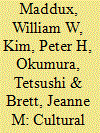

|
|
|
|
|
| Publication |
2011.
|
| Summary/Abstract |
One of the most effective means for re-establishing trust in negotiations and disputes is by making an apology. However, the function and meaning of an apology (and thus its effectiveness for negotiators) may differ across cultures. We hypothesized that people from an individual-agency culture (such as the United States) understand apologies as analytic mechanisms for assigning blame and re-establishing personal credibility. In contrast, apologies in collective-agency cultures (such as Japan) are understood to be general expressions of remorse rather than a means to assign culpability. A survey of Japanese and Americans found that, compared to Americans, Japanese apologized more often and were more likely to apologize for actions in which they were not involved; on the other hand, Americans were more likely than Japanese to equate apologizing with personal blame. A subsequent experimental study showed that these cultural differences in the function and meaning of apologies have implications for trust repair in disputes: apologies for integrity violations led to greater trust repair for Japanese than for Americans, but apologies for competence violations were somewhat more effective for Americans than Japanese. Implications for theory and practice are discussed.
|
|
|
|
|
|
|
|
|
|
|
|
|
|
|
|
| 19 |
ID:
186523
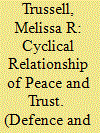

|
|
|
|
|
| Summary/Abstract |
This paper examines many instances of the same investment game to explore the questions of how violence affects trusting and trustworthy behaviors and how those behaviors affect a country’s level of violence or peacefulness. Average responses of players in the investment game are compared across countries experiencing varying degrees of peacefulness or conflict. The primary finding is that a macroeconomic peace index can predict trusting behavior but has no effect on trustworthy behavior. Trustworthiness, on the other hand, affects peacefulness. It is necessary, then for policymakers to foster trust and trustworthiness among individuals in order to maintain peace, and they must work to rebuild macroeconomic institutions to restore trust, to repair communities, and to revitalize economies after conflict.
|
|
|
|
|
|
|
|
|
|
|
|
|
|
|
|
| 20 |
ID:
188386
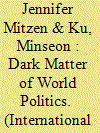

|
|
|
|
|
| Summary/Abstract |
International relations theory has had a trust revival, with scholars focusing on how trust can enhance interpersonal cooperation attempts between leaders. We propose there is another type of trust at play in world politics. International system trust is a feeling of confidence in the international social order, which is indexed especially by trust in its central unit, state persons. System trust anchors ontological security, and its presence is an unstated assumption of the international relations trust scholarship. In this paper we conceptualize system trust. We illuminate its presence by flagging the production of state personhood in a familiar case in international relations trust scholarship, the 1985 Geneva Summit between Reagan and Gorbachev. Interpersonal and system trust perspectives highlight different aspects of the same summit. The juxtaposition suggests new lines of research into the production of state persons in diplomacy, the relationship between interpersonal and system trust, and the impact of the rise of personalistic/patrimonial leadership on diplomacy and international order.
|
|
|
|
|
|
|
|
|
|
|
|
|
|
|
|
|
|
|
|
|